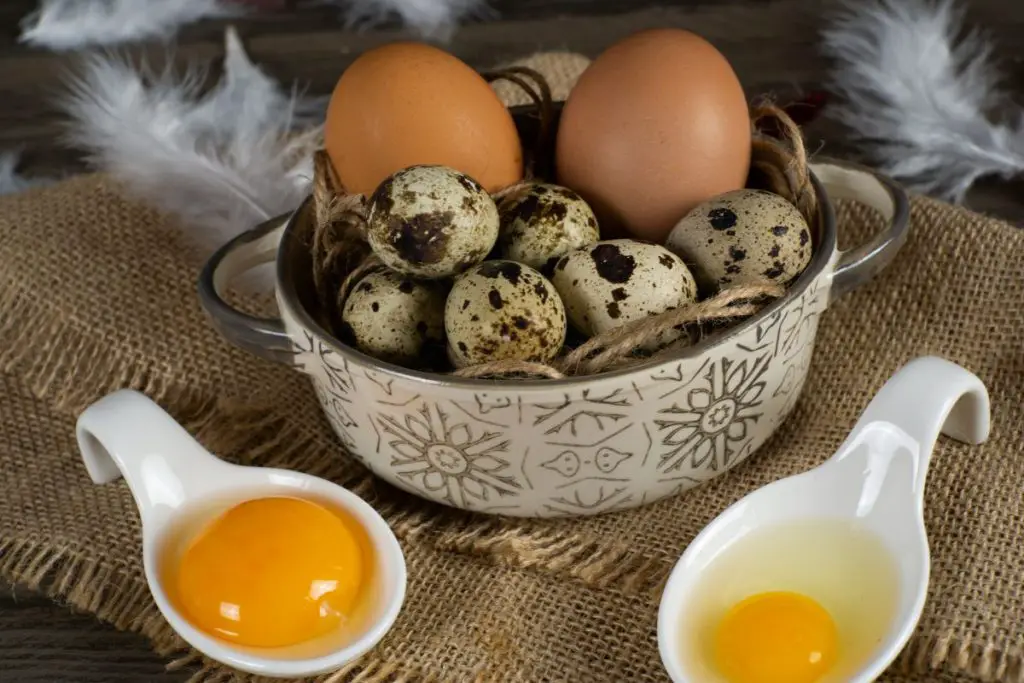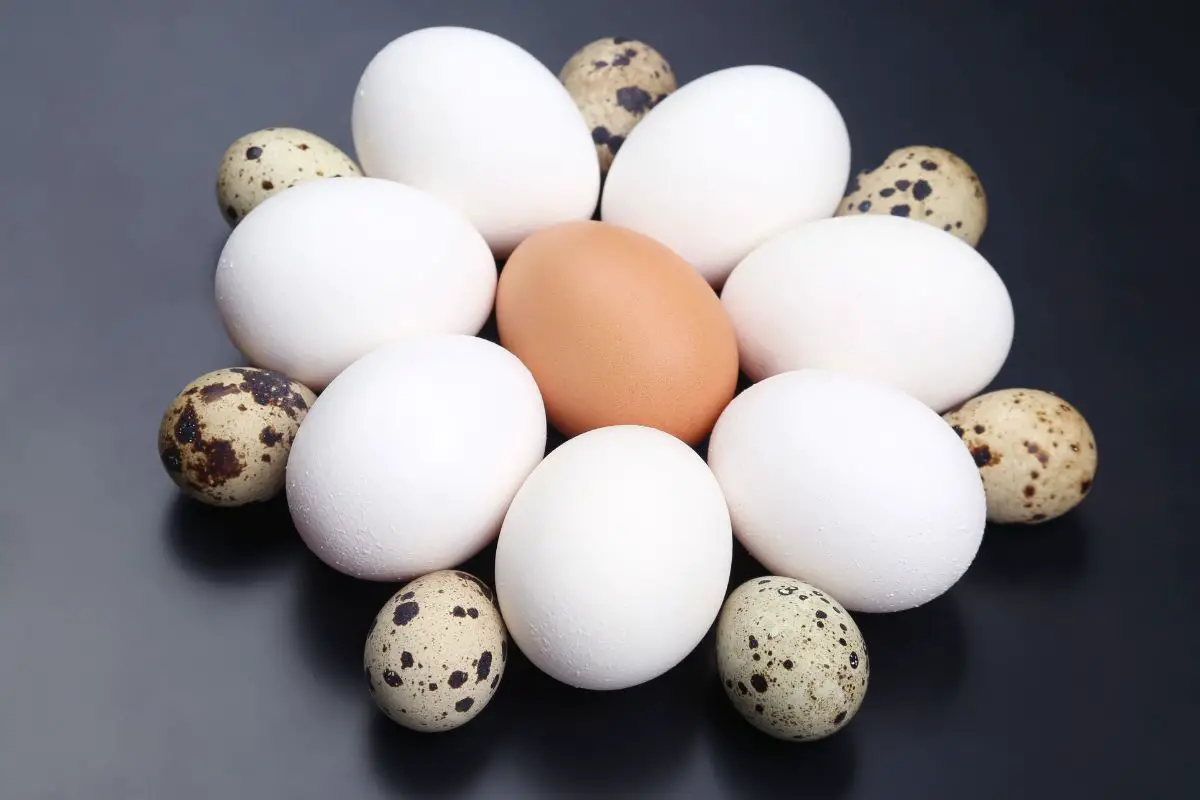Both quail eggs and chicken eggs are rich in protein, fat and iron with quail eggs being slightly more nutritious. The main drawback is the higher cholesterol levels in quail eggs, although people generally eat fewer quail eggs during a meal than chicken eggs.
Quail farming is becoming more and more popular today—and for good reason. It requires little space and offers good egg production. Almost everyone can raise quails are they are very affordable.
But one frequently asked question is: how different are quail eggs from chicken eggs or even duck eggs? Do quail eggs taste different? Are they more nutritious? What are the benefits of quail eggs?
When considering quail eggs vs chicken eggs, we know that both are rich in protein, fat, and iron.
Table of Contents
Quail Eggs vs Chicken Eggs
Apart from their obvious size differences, quail eggs and chicken eggs are fairly similar.

However, these are still a few characteristics that set the two apart:
| Quail Eggs | Chicken Eggs | |
| Size | 77mm diameter 35mm length | 43mm diameter 62mm length |
| Weight | 5 to 15 grams | 30 to 70 grams |
| Color | White, grey and brown Black speckles all over | Brown, white, blue and green Minimal or no speckles |
| Taste | Richer and creamier | Can be bland |
| Nutrition | More nutritious | Less nutrious |
| Cholesterol | Higher | Lower |
| Eggs/Year | 300+ | 100 to 300 |
| Cooking | Faster | Slower |
| Cost | More expensive (Limited supply) | Much cheaper (Massive supply) |
| Storage | 5 to 6 weeks | 3 to 5 weeks |
Taste
The bold yolk of a quail egg makes many think that it gives it a rich flavor. Quail egg yolks tend to be creamier and richer than chicken egg yolks.
However, both have similar taste and many people cannot tell the difference.
Besides taste, there is also a difference in consistency between these two types of eggs.
In chicken eggs, the albumin or egg white makes up approximately two-thirds of the entire egg. On the other hand, quail eggs have more egg yolk than albumin (egg white).
When a quail egg is used in baking or cooking, it produces a thicker and creamier texture as compared to that of a chicken egg.
Overall, both types of eggs taste almost the same. However, quail eggs tend to creamier than chicken eggs.
Nutritional value
Both quail eggs and chicken eggs have great nutritional profiles.
Although quail eggs are smaller than chickens eggs, they have a large yolk-to-egg white ratio because they have large egg yolks.
Since the yolk contains many of the essential nutrients in eggs, some people think that quail eggs contain more nutrients than chicken eggs.
However, we need to compare apples-to-apples since quail eggs are much smaller than chicken eggs.
When it comes to nutritional value by weight, 100g of chicken eggs are less nutritious than 100g of quail eggs. However, more quail eggs would be needed to enjoy the same nutrients because they are much smaller.
Quail eggs have more protein and fat content by weight, more antioxidants, vitamin A, vitamin B12, iron, folate, riboflavin, selenium, and phosphorus than chicken eggs. However, chicken eggs have more choline.
Overall, quail eggs and chicken eggs are both healthy. None is far superior to the other nutrient-wise. If you’re considering adding one of the two types of eggs to your diet, the choice is yours!
Cholesterol Levels
Quail eggs contain much more cholesterol than chicken eggs because they have a higher egg yolk-to-egg white ratio.
An egg yolk is packed with cholesterol. Since nearly all of the cholesterol and fat is found in the egg yolk, quail eggs have higher cholesterol levels than chicken eggs.
According to a recent USDA report, 100 grams of quail eggs contain 844 milligrams of cholesterol (which translates to eleven quail eggs) compared to 100 grams of chicken eggs that contain 373 milligrams of cholesterol (which translates to two chicken eggs).
Egg Production
The Japanese quail (also known as the Coturnix quail) lays one egg every day, but in rare cases, they can lay two eggs in a day if they are young and healthy. Quails can lay up to 300 eggs per year.
On the other hand, chickens lay just one egg a day and sometimes just one egg every two days. The average hen lays around 180 to 200 eggs per year.
Storage Life
You should store both quail eggs and chicken eggs unwashed to protect their natural bloom. This bloom helps to protect the eggs from air and bacteria, keeping them fresh for a longer period.
With proper storage, fresh chicken eggs can last at least 3 to 5 weeks in the refrigerator.
Refrigerated quail eggs can last up to 5 or 6 weeks, but it’s advisable to use them within 4 weeks if possible. While still healthy and safe to eat, quail eggs may taste stale after 5 weeks.
Eating Quail Eggs
You can prepare both chicken eggs and quail eggs in the same way. However, quail eggs have very fragile egg shells so you should be careful when opening them. You can purchase a pair of quail egg scissors or a serrated knife to help you to avoid shattering the eggshell.
You can boil them, scramble them, make omelets with them, or even bake cakes with them. Just remember 5 to 6 quail eggs are equivalent to one regular chicken egg, and since they are so small, quail eggs are faster to cook.
Eating Chicken Eggs
Chicken eggs are a very versatile ingredient. You can boil them, fry them, or bake with them.
Just avoid combining them with unhealthy food like sausage, lard, and bacon. This is because you can easily exceed normal cholesterol levels and you don’t want to clog the food with unhealthy calories, fats, and carcinogens.
You can eat lard and sausages in moderate quantities, but it’s best to separate them from your eggs.
You should also supplement your diet with other healthy foods such as bran bread, fruits and vegetables. This will help you diversify your meals and maintain a normal cholesterol level.
FAQs
Are quail eggs more nutritious than chicken eggs?
Quail eggs have the same nutritional profile and health benefits as chicken eggs. Both options have high protein content and are safe and delicious, so the choice is yours.
How many quail eggs are equivalent to one chicken egg?
One regular chicken egg weighs about 50 grams, which is equal to 5 or 6 quail eggs weighing about 9 grams each.
How many quail eggs should I eat per day?
You can eat 5 to 50 quail eggs per day, but most people keep their intake to less than 10 per day due to high cholesterol levels when compared to chicken eggs.
Both have impressive nutritional content, except for the fact that quail eggs have more cholesterol content—which you shouldn’t worry much about as long as your serving size is reasonable.

